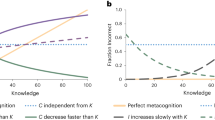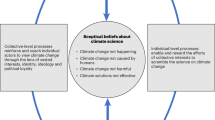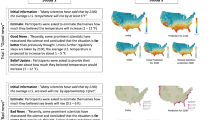Abstract
Accurate confidence—confidence that reflects the accuracy of knowledge—can be relevant for decision-making in areas of high uncertainty. Accuracy of confidence is of particular importance in the area of climate change where scientifically correct information exists alongside misinformation in the public discourse and media. Here we assess the accuracy of confidence in climate change knowledge in a national German sample (n = 509). The accuracy of the confidence of the citizens in their climate change knowledge was only around half of what it could be based on the accuracy of their knowledge. Moreover, the accuracy of confidence controlling for knowledge accuracy was lower for climate change than for two benchmark comparisons: general science knowledge in another national German sample (n = 588), and climate change knowledge in a scientist sample (n = 207). Although these results cannot necessarily be generalized to the population of all indicators of climate change knowledge, the results suggest that the confidence of citizens in their climate change knowledge is unnecessarily fuzzy given their actual knowledge.
This is a preview of subscription content, access via your institution
Access options
Access Nature and 54 other Nature Portfolio journals
Get Nature+, our best-value online-access subscription
$29.99 / 30 days
cancel any time
Subscribe to this journal
Receive 12 print issues and online access
$209.00 per year
only $17.42 per issue
Buy this article
- Purchase on Springer Link
- Instant access to full article PDF
Prices may be subject to local taxes which are calculated during checkout



Similar content being viewed by others
Data availability
The data that support the plots within this paper and other findings of this study are available at https://osf.io/z53m7/.
Code availability
The analysis code (in R) that produces all results and plots of this study is available at https://osf.io/zdaqw/.
References
Simon, M. & Houghton, S. M. The relationship between overconfidence and the introduction of risky products: evidence from a field study. Acad. Manage. J. 46, 139–149 (2003).
Berner, E. S. & Graber, M. L. Overconfidence as a cause of diagnostic error in medicine. Am. J. Med. 121, S2–S23 (2008).
Johnson, D. D. P. Overconfidence and War (Harvard Univ. Press, 2009).
Shi, J., Visschers, V. H., Siegrist, M. & Arvai, J. Knowledge as a driver of public perceptions about climate change reassessed. Nat. Clim. Change 6, 759–762 (2016).
Sundblad, E.-L., Biel, A. & Gärling, T. Knowledge and confidence in knowledge about climate change among experts, journalists, politicians, and laypersons. Environ. Behav. 41, 281–302 (2009).
Juslin, P., Olsson, N. & Winman, A. Calibration and diagnosticity of confidence in eyewitness identification: comments on what can be inferred from the low confidence–accuracy correlation. J. Exp. Psychol. Learn. Mem. Cogn. 22, 1304–1316 (1996).
Hadar, L., Sood, S. & Fox, C. R. Subjective knowledge in consumer financial decisions. J. Mark. Res. 50, 303–316 (2013).
Meyer, A. N., Payne, V. L., Meeks, D. W., Rao, R. & Singh, H. Physicians’ diagnostic accuracy, confidence, and resource requests: a vignette study. JAMA Intern. Med. 173, 1952–1958 (2013).
Jackson, S. A. & Kleitman, S. Individual differences in decision-making and confidence: capturing decision tendencies in a fictitious medical test. Metacogn. Learn. 9, 25–49 (2014).
Hiles, S. S. & Hinnant, A. Climate change in the newsroom: journalists’ evolving standards of objectivity when covering global warming. Sci. Commun. 36, 428–453 (2014).
Elsasser, S. W. & Dunlap, R. E. Leading voices in the denier choir: conservative columnists’ dismissal of global warming and denigration of climate science. Am. Behav. Sci. 57, 754–776 (2013).
Williamson, P. Take the time and effort to correct misinformation. Nature 540, 171 (2016).
Miller, T. M. & Geraci, L. Training metacognition in the classroom: the influence of incentives and feedback on exam predictions. Metacogn. Learn. 6, 303–314 (2011).
Sanbonmatsu, D. M., Posavac, S. S., Kardes, F. R. & Mantel, S. P. Selective hypothesis testing. Psychon. Bull. Rev. 5, 197–220 (1998).
Park, J., Konana, P., Gu, B., Kumar, A. & Raghunathan, R. Confirmation Bias, Overconfidence, and Investment Performance: Evidence from Stock Message Boards McCombs Research Paper Series No. IROM-07-10 (SSRN, 2010).
Lewandowsky, S., Oberauer, K. & Gignac, G. E. NASA faked the moon landing—therefore, (climate) science is a hoax: an anatomy of the motivated rejection of science. Psychol. Sci. 24, 622–633 (2013).
Fleming, S. M. HMeta-d: hierarchical Bayesian estimation of metacognitive efficiency from confidence ratings. Neurosci. Conscious. 2017, nix007 (2017).
Dienes, Z., Altmann, G., Kwan, L. & Goode, A. Unconscious knowledge of artificial grammars is applied strategically. J. Exp. Psychol. Learn. Mem. Cogn. 21, 1322–1338 (1995).
Burton, R. F. & Miller, D. J. Statistical modelling of multiple-choice and true/false tests: ways of considering, and of reducing, the uncertainties attributable to guessing. Assess. Eval. High. Educ. 24, 399–411 (1999).
Gigerenzer, G., Hoffrage, U. & Kleinbölting, H. Probabilistic mental models: a Brunswikian theory of confidence. Psychol. Rev. 98, 506 (1991).
Allgood, S. & Walstad, W. B. The effects of perceived and actual financial literacy on financial behaviors. Econ. Inq. 54, 675–697 (2016).
Tenney, E. R., Spellman, B. A. & MacCoun, R. J. The benefits of knowing what you know (and what you don’t): how calibration affects credibility. J. Exp. Soc. Psychol. 44, 1368–1375 (2008).
Baldiga, K. Gender differences in willingness to guess. Manage. Sci. 60, 434–448 (2014).
Science & Engineering Indicators 2018. Science and Techology: Public Attitudes and Understanding Ch. 7 (National Science Board, accessed 24 May 2019); https://www.nsf.gov/statistics/2018/nsb20181/report/sections/science-and-technology-public-attitudes-and-understanding/highlights
Weber, N. & Brewer, N. The effect of judgment type and confidence scale on confidence-accuracy calibration in face recognition. J. Appl. Psychol. 88, 490 (2003).
Bornstein, B. H. & Zickafoose, D. J. “I know I know it, I know I saw it”: the stability of the confidence–accuracy relationship across domains. J. Exp. Psychol. Appl. 5, 76–88 (1999).
Overgaard, M. Behavioral Methods in Consciousness Research (Oxford Univ. Press, 2015).
Galvin, S. J., Podd, J. V., Drga, V. & Whitmore, J. Type 2 tasks in the theory of signal detectability: discrimination between correct and incorrect decisions. Psychon. Bull. Rev. 10, 843–876 (2003).
Maniscalco, B. & Lau, H. A signal detection theoretic approach for estimating metacognitive sensitivity from confidence ratings. Conscious. Cogn. 21, 422–430 (2012).
Acknowledgements
We acknowledge support by the Excellence Initiative, Institutional Strategy ZUK 5.4 (Scientific Computing in the Social and Behavioral Sciences), Heidelberg University, and support of the Heidelberg Center for the Environment, Heidelberg University.
Author information
Authors and Affiliations
Contributions
H.F., D.A. and N.S. designed the study for the knowledge of climate change in citizens. H.F. designed the study for the knowledge of climate change in scientists and general science knowledge in citizens. H.F. and N.S. analysed the data. H.F. wrote the paper. All authors edited and approved the manuscript.
Corresponding author
Ethics declarations
Competing interests
The authors declare no competing interests.
Additional information
Peer review information: Nature Climate Change thanks Sander van der Linden and other, anonymous, reviewer(s) for their contribution to the peer review of this work.
Publisher’s note: Springer Nature remains neutral with regard to jurisdictional claims in published maps and institutional affiliations.
Supplementary information
Supplementary Information
Supplementary Figs. 1, 2, Supplementary Note 1, Supplementary Table 1.
Rights and permissions
About this article
Cite this article
Fischer, H., Amelung, D. & Said, N. The accuracy of German citizens’ confidence in their climate change knowledge. Nat. Clim. Chang. 9, 776–780 (2019). https://doi.org/10.1038/s41558-019-0563-0
Received:
Accepted:
Published:
Issue Date:
DOI: https://doi.org/10.1038/s41558-019-0563-0
This article is cited by
-
Democrats are better than Republicans at discerning true and false news but do not have better metacognitive awareness
Communications Psychology (2023)
-
The impact of 1.5 °C and 2.0 °C global warming on global maize production and trade
Scientific Reports (2022)
-
Time-sensitive prefrontal involvement in associating confidence with task performance illustrates metacognitive introspection in monkeys
Communications Biology (2022)
-
Carbon tax acceptability with information provision and mixed revenue uses
Nature Communications (2021)
-
False statements about climate change trip people up
Nature (2019)



